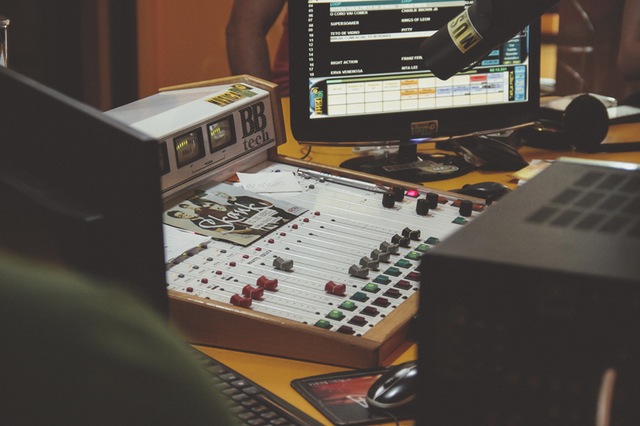
The Background…
Without a doubt, succeeding at a sports media job seems attainable to most sports fans. Many of us already spend way too much time talking about sports at the bar or coffee station at work. Why not put on a headset and do it for money? It obviously is not that simple. Much like someone who works in sports media, it takes a certain type of person and the right studies to become successful in the competitive field of sports radio. The position falls under the umbrella career of a radio disc jockey, someone who plays music, interviews guests, and provides news, sports, and weather updates to listeners. Talk stations choose a specific format, usually religion, politics, news, general entertainment, or sports. The sports format continues to boom as fans look for an outlet to play armchair quarterback and talk about the players and the coaches they love and love to hate. Many major cities have more than one sports talk station, and satellite radio has brought even more listening options into the fold. And, while it remains a challenging field to break into if you have the right skill set and passion for pursuing it, a sports radio job is an enviable career to land.

When people think about sports radio jobs, on-air talent is what comes to mind. But, most typically, you will start behind the scenes, working on sound equipment, screening calls, and producing shows. This allows you to understand the process of creating a successful radio show from the ground up while you slowly work your way on the air as a fill-in host. If your talents translate well over the radio, you could eventually earn yourself a regular time slot. Radio stations receive the most listeners during the morning and evening work commutes. Those are the two prime spots, followed by middays, nights, and overnights. Many hosts get their start on this less-than-popular overnight shift. Before the show begins, there is a planning meeting to discuss the day’s guests, advertising spots, and show topics. While the show is in progress, sports radio producers queue up callers, line up guests, and signal for commercial breaks. Sound engineers ensure the signal quality is high and put together buffer music and voice clips for intros and outros from breaks. After shows conclude, a post-show meeting is scheduled to discuss how everything went, plan the next day’s show, and do long-term planning. Hosts are on-air for three to five hours a day but work equally hard off-air, attending meetings, doing off-site appearances, and taping advertising spots for the station.
Related Jobs
- New Media & Design Coordinator
Sports Media - Central Region
Successful “sports talkers” have varying on-air personas, but the best of them have several common characteristics. Having a quick wit, being humorous, or having the ability to engage or infuriate others into the conversation is important. Also, your voice must be distinctive; a monotone drone sounds even worse over the radio than it does in person. If you have a heavy accent or a speech impediment, this may not be the career for you. Speech coaches may aid in this development area, though, so investigate that before you give up. Beyond a clear and expressive voice, sports radio professionals – on and off-air – must be technically savvy with radio sound equipment. Understanding the tools of the trade is a vital part of breaking into the business. And being organized and well-planned are a necessary part of the field too. The pre and post-show planning meetings ensure forethought into how a show should run. You’ll be lucky to stay on-air one week, let alone one year, without a high level of planning. Knowing local and national sports inside and out is necessary for anyone with a sports radio job, whether you spent hours each day talking about it with callers or are behind-the-scenes booking guests and planning shows.
Sports radio jobs are a competitive career choice because there are only one or two stations per major market to hire into. Fast upward movement may require semi-frequent relocation and odd work hours at first. Many radio stations are 24/7, so weekends and nights are often considered core work hours in the industry. For its many quirks, becoming a sports radio professional is a dream job for many people. Work hard, develop the right skills, and be flexible in finding your way through the industry.
The Path to Sports Radio Jobs
Successful sports radio careers typically start with a bachelor’s degree in broadcasting or journalism. Broadcasting school will teach you the finer points of what goes into a successfully produced show. You’ll learn on-air skills including voice exercises and how to pace a broadcast. Broadcasting school will also teach you the technical aspects of a radio program, including sound equipment functionality and the overall production process.
College radio presents an amazing opportunity to hone your skills and build your resume. As you begin your broadcasting education, quickly find the local radio station, and get a job – any job – there. While your degree is important, the real-world experience will make you stand out among the crowd. From the moment you determine this is your career path, take every opportunity you can to get behind a microphone or television camera. Internships are another chance to better your skills and add to your resume. An internship may not put you behind the microphone or earn you a lot of money, but you’ll become more familiar with the equipment and the broadcast process while developing a great network of contacts.
Related Jobs
- Director of Communications and Broadcasting
Sports Media - West Region
The age of the locally owned radio station is mostly over. While some privately owned stations still exist, Clear Channel Communications and CBS Radio have their tentacles in most markets. That fact is not necessarily bad or good but it is important to know what companies to look for as you begin your search. Locating sports radio jobs and working your way up to an on-air spot is the best you can hope for. In reality, you may need to start at a different type of radio station, gain the right experience, and continue applying for your dream job. Earn a degree, gain experience, and grow your professional network to give yourself every opportunity to succeed.
The Money in Sports Radio Jobs
The Bureau of Labor Statistics estimates the median annual wage of radio and television announcers as $30,960 as of 2015. While the lowest 10 percent earned less than $18,000, the top 10 percent earned more than $86,780, with the best earning over a million dollars per year. While this statistic doesn’t exactly nail down a sports radio job salary, it paints an accurate picture.
Starting salaries for sports radio jobs are usually in the low $20,000 range. But the top-end salary can creep into the seven figures. Becoming one of the top 10% salary earners only happens by getting into a larger market and primetime slot. Be willing to work extra shifts or across stations to maximize your earning potential while you work your way into a full-time, on-air gig.
If sports radio jobs sound like the perfect fit for you, start your search today to find your dream career. We have the most comprehensive list of sports job openings and add more daily. Join our network today!





